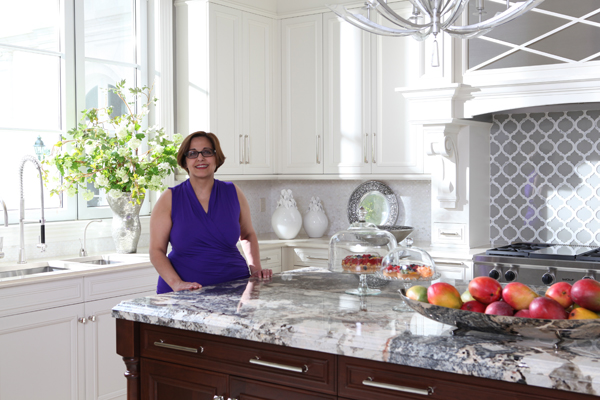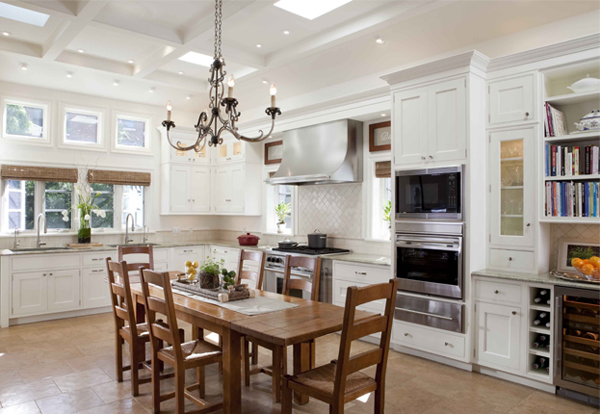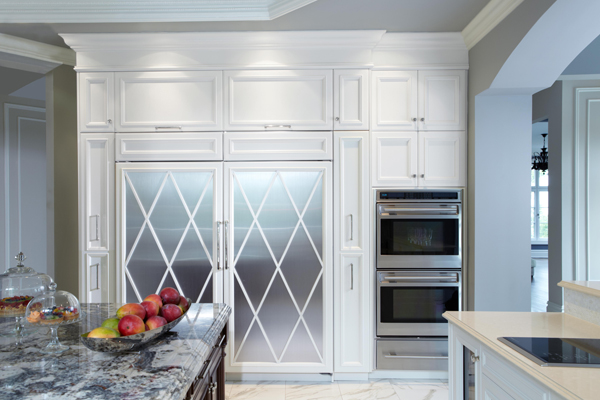Recently, I was able to talk at length with renown kitchen designer Vasi Ypsilantis about the creative process, her distinguished career, and how her participation in the Kitchen Design Contest – both as a winning recipient, and later as a judge – has shaped her process and benefited her career.
Vasi began her design career in 1985 after attending Fashion Institute of Technology in New York City. Starting in the kitchen design and cabinet sales industry, she honed her skills quickly and became a partner in her first business in 1989 and in 1999, she opened Vasi Ypsilantis Design Associates, her own boutique kitchen and bath showroom.

Over the past few decades Vasi’s extensive portfolio of work has been published in numerous national and international magazines, and she has acquired loyal clientele. Vasi has created kitchens and other spaces for numerous show houses and historic homes, for which she has won two Notable Designer of Distinction awards. Her work in 2007 at LaSelva in Upper Brookville, N.Y. earned her first place for best traditional kitchen design in the national Sub-Zero and Wolf Kitchen Design Contest, a competition for which Vasi served as a judge in 2013 and will again in 2015.
Bob (LoaA): How did you decide to start specializing in kitchen design?
Vasi: It was quite by accident. I went to interior design school at FIT. My intention was either to begin a career in architecture or art history since my passion was to become an art historian. In fact, after I completed my degree at FIT, I enrolled in additional art history courses in England, and spent about nine months in Europe soaking up the history, landscape and culture.
Eventually I decided return to the States and find a job, so I could support my newfound love for travel. I went to the career placement office and applied for an assistant kitchen designer position. I thought, “Oh, how unglamorous that is. That’s the perfect job because I won’t stay there more than a month and I can continue on with my travels.” That was 30 years ago and I’ve been in the kitchen business ever since.
My first job was in a high-end kitchen showroom which gave me the opportunity to design for clients with big budgets – making it easier to be creative. It was one of the first showrooms to offer European cabinetry and high-end appliances, so it was my introduction to the stylish and functional products manufactured by Sub-Zero.
Bob (LoaA): What city was this in?
Vasi: Great Neck, New York. I lived in Brooklyn then, and I took two trains and a cab to get to work because I was convinced that I was not going to keep this job. I made it really difficult for myself to stay in kitchen design. However, I quickly fell in love with the business, back in the day when it wasn’t popular to be a kitchen designer.

Bob (LoaA): Why do you think you had experienced such success as a kitchen designer?
Vasi: I had a passion for kitchen design early on since it allowed me to develop my talent in two key areas. It was important to me to be able to use my architecture and space planning skills since kitchen design is not just about decoration. The kitchen must also incorporate function – ergonomics combined with aesthetics. And I am a designer that really loves to design with purpose. It is my specialty. And I finally found my niche, on a smaller scale obviously than architecture or art history.
Bob (LoaA): The approach that you take in your design process is very spatial – you use the phrase that the process wasn’t decorative, but design with purpose.
Vasi: That’s the constant challenge that keeps us motivated and passionate. It doesn’t get boring because every space is unique. Every situation is different whether it’s new construction, renovations where you have to respect the historical details, or working within guidelines directed by residential architects, or starting with a blank canvas on a new construction project where you have complete creative freedom. I attribute my success to being flexible in every situation and working well with other professions, contractors, electricians, plumbers, etc.
Bob (LoaA): I know that you are a former Sub-Zero and Wolf] Kitchen Design Contest winner – did you notice an impact to your business once you won it?
Vasi: Yes. I think the biggest change was that usually it took three or four meetings to convince a client that I’m a kitchen expert and design professional. After winning the Kitchen Design Contest it made the client’s decision process a lot quicker, I earned more respect from peers and it gave me more confidence as an expert in my field. I always say, “It took 22 years to get to that point. But it took one award really to just wrap it up.”
It is an award that has merit and has a lot of weight with the public as well as highly visible in our industry. And to think that I had not entered a contest before this one!
Bob (LoaA): When were you first selected to be a judge in the Kitchen Design Contest?
Vasi: Actually, it was right after my win. And that was really exciting just to think about the people I would be working with as peers were the same people that I’ve looked up to in the industry.

Bob (LoaA): Did you find that process as rewarding as you had hoped?
Vasi: Absolutely. What I did find was it gave me a lot more self-confidence, because I felt like I was on the same page as people that I looked up to in the profession. I felt that we all had the same mindset and goals. It certainly made me respect the judging process even more.
Bob (LoaA): I always think that one of the neat things about being a judge is that you get to look at all these great designs where you must think, “Wow … I haven’t seen that before. That’s really great.”
Vasi: Oh absolutely. I was very, very impressed with all the foreign entries. And I think it’s because you find, even in kitchen design, the influence of your surroundings, the influence of the professionals around you – and when you see an entry that’s pushed the envelope, it reminds you that it’s okay to push the envelope. It’s okay to design outside the box if it works. Because somebody accomplished it and it looks fantastic.”
There is always a balance. You want to create beautiful and truly customized designs. But you also want to have something that stands the test of time – a classic design. What I took from this experience is sometimes we need to get out of our design comfort zone. Sometimes design is temporary and it’s okay because it’s beautiful too.
Bob (LoaA): Did you find that your own work was influenced by what you were seeing?
Vasi: Yes. I pushed the envelope a little bit more when it came to mixing materials. I have always mixed styles for show houses or special projects, and after reviewing the entries, I started to incorporate more of a design mix on client projects to match their own unique lifestyle. And I wasn’t fearful that they would reject it. The projects that gave me the green light turned out fabulous!
Bob (LoaA): Did you find that your involvement in this process benefited you in the way that you work, or how you are viewed by your peers?
Vasi: Definitely. I think my peers thought, “Wow. It’s really great that you’re involved, and that somebody would invite you to be a judge.” I think, “They’re right, it is an honor. And it’s really a compliment that a prestigious contest and major appliance manufacturer is qualifying and validating my work.
Vasi was incredibly gracious with her time and I thoroughly enjoyed speaking with her. In Part 2 of this interview, we are going to talk about how kitchens have evolved over the last 20+ years, technology, kitchen islands, pantry spaces, and lighting. After spending so much time talking with Vasi, it is easy to see why she has been selected to participate as a judge in the Sub-Zero and Wolf Kitchen Design Contest. If you would like to learn more, I have included links here to everything you might like to know more about the judges, the awards and prizes, or the rules of this event.

Disclosure of Material Connection: I have partnered with Sub-Zero and Wolf to provide my professional opinion about kitchen design and document its Kitchen Design Contest. While I am being compensated, I only recommend products or services I may use or will use personally and believe will be good for my readers. I am disclosing this in accordance with the Federal Trade Commission’s 16 CFR, Part 255: “Guides Concerning the Use of Endorsements and Testimonials in Advertising.”
